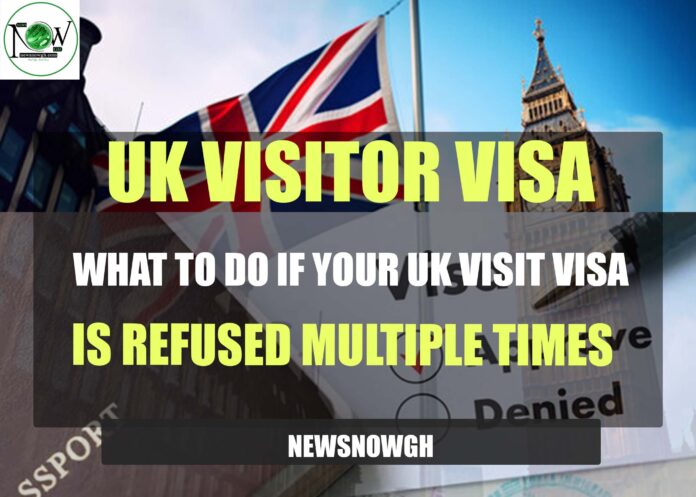What to Do If Your UK Visit Visa Is Refused Multiple Times | UK Visitor Visa
It can be upsetting to be turned down for a UK visit visa repeatedly, especially if the reason why isn’t quite obvious. Applications that lack sufficient proof or raise questions about the applicant’s intentions are usually denied by the UK Home Office.
In this blog post, we’ll look at the typical causes of visa rejections and provide advice on how to increase your chances of getting approved.
Why is Your UK Visit Visa Being Refused
The Home Office will provide a decision letter outlining the reasons for any denials of your UK Visit Visa. Refusals frequently happen when applicants are unable to persuade the Home Office that they are actual visitors.
The reason for your visit, whether you plan to depart the country after it, worries about making repeat or frequent trips, and the availability of enough money to cover your stay are a few of the variables they take into account.
Common Reasons for UK Visit Visa Refusals
Refusals of visas can stem from several typical problems, including inconsistent paperwork, no connection to your country of origin, inadequate financial support, and prior denials of visas or failure to comply with requirements.
How Do You Respond to Prior Declines?
It’s critical to address the concerns brought up in earlier submissions if your visa application has been denied more than once. Make sure all of your paperwork is in order, demonstrate that you have enough money for the trip, and have strong ties to your home nation.
Although it can be disheartening to receive repeated denials for a UK visit visa, it’s crucial to address the concerns raised by the Home Office. Enhancing your application materials and presenting a clear and sincere intention to apply can greatly increase your chances of being accepted.
Options for Staying Longer in the UK on a Visitor Visa
Are you wondering if you can stay longer in the UK than what your Visitor Visa allows? Although there are a few unusual circumstances in which you might be allowed to stay longer, the UK government has rigorous immigration laws in place to guarantee that visitors return to their own country.
In this blog post, we’ll look at some of the alternatives accessible to tourists who wish to stay longer in the UK and provide advice on how to meet these difficult requirements.
Challenges for UK Visitor Visa Holders
The UK government makes it very challenging for people with a UK visitor visa to change to a different type of visa. It is difficult for visitors to stay longer in the UK because it is usually expected that they will depart following their visit.
Extending a UK Visitor Visa
You may request an extension in some extraordinary circumstances, such as when you require medical attention or are caring for someone else. However, these cases need to have strong supporting evidence and be motivated by important or humane reasons.
Are you able to apply for asylum in the UK?
You can apply for asylum in the UK if it is unsafe for you to return to your home country. Due to the complexity of this application, a strong justification supported by ample evidence is needed.
Staying on Private Life Grounds in the UK
Article 8, which safeguards private and family life, allows you to request to stay in the UK if you got married or had a kid while you were there. However, this is a challenging application requiring confirmation of considerable personal suffering.
Although difficult, it is possible to extend your visitation visa’s validity in the UK under certain situations. Strong proof and expert advice are required throughout the process, regardless of the reason—medical, asylum, or private life. To increase your chances of success in such a case, you must get legal aid.
Understanding the New UK Visitor Visa Rules
Significant modifications that are essential for foreign tourists have been made to the UK government’s visitor visa regulations. This update offers a succinct summary of these new rules, emphasizing the most important topics for anyone who intends to work or visit the UK.
Regulations governing remote work, direct client work for employees of incorporation firms, improved chances for research and collaboration, and increased legal activities for foreign attorneys are some of the major subjects covered in this update.
Remote Working on a UK Visitor Visa
As long as it’s not their main reason for visiting, the new regulations permit tourists to work remotely while in the UK in connection with their foreign jobs. In response to the widespread trend of remote work, this version takes a more flexible stance.
Intercorporate Activities and Client Engagement
The intercorporate activities that are permitted under the Visitor Visa have undergone significant modifications. Direct customer engagement is now possible for employees of foreign companies in the UK, however, this should be secondary to their principal work overseas.
Research Opportunities for Scientists and Academics
The revised regulations allow scientists, researchers, and academics to work together and carry out independent or collaborative research relating to their jobs abroad by combining the preceding categories. Consequently, increasing the opportunity for scholarly and scientific interaction before their visit
Legal Services by Overseas Lawyers
The range of activities that are acceptable for legal practitioners visiting the UK has been greatly expanded. Due to a major liberalization of earlier prohibitions, overseas lawyers are now able to provide a variety of legal services, including transactional and litigation services.
These modifications provide guests with more freedom and more transparent rules, which ought to make their trip to the UK for professional legal activities, business, and research easier and more fruitful.
Follow us on Newsnowgh.com to stay updated on the latest information regarding work permits, visa application processes, paths to permanent residency, and visa-sponsored employment.


